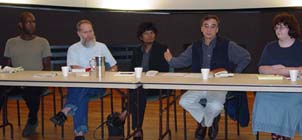On Monday night, Nov. 3, a group of faculty and staff panelists discussed the topic of civil disobedience in Bryan Jr. Auditorium.
‘Civil disobedience’ is a term that has been used variously around campus a lot lately. While those involved in the forum would not discuss the most recent alleged act of civil disobedience, they did provide information about the general concept for Guilford to consider.
Panelists Vance Ricks, Max Carter, Shellini Harris, Vernie Davis, and Jodi Gill discussed what civil disobedience means as it pertained to each of their specific fields.
Ricks cited passages of philosophy from Socrates, while Carter preferred the wise words of his fellow Friends.
“Our ultimate allegiance is to God,” said Carter, noting that people should not simply break laws because they are “inconvenient.”
Harris discussed Martin Luther King Jr.’s and Mahatma Gandhi’s approaches toward performing an act of civil disobedience. As King put it, one must first gather the facts, negotiate with the authorities, go through self-purification, and afterwards one can finally take direct action.
Self-purification, Harris explained, is a step of introspection to discern whether or not your motives are pure. “If you are demanding justice from another, look at yourself and [see] if you are also just,” she said.
Davis emphasized the importance of non-violence when protesting. “Non-violence is much more effective when perceived by the [opposing] party,” said Davis.
Finally, Gill discussed the legal side of civil disobedience.
She mentioned that our ownContinued from page 1
country was founded upon that principle. The Declaration of Independence states that “whenever any form of Government becomes destructive of these ends, it is the Right of the People to alter or to abolish it.”
Gill also explained Guilford’s Dissent Policy – something rare among most institutions. Gill said that higher education should emphasize the free exchange of ideas, and that “that’s a tradition we want to encourage in all our students.”
For the history of civil disobedience at Guilford see page 9
Civil Disobedience panel convenes

Forum gathers to discuss Civil Disobedience. From left: Vance Ricks,Max Carter, Shelini Harris, Barton Parks,and Jodi Gill (MeganMiller/ Guilfordian)
